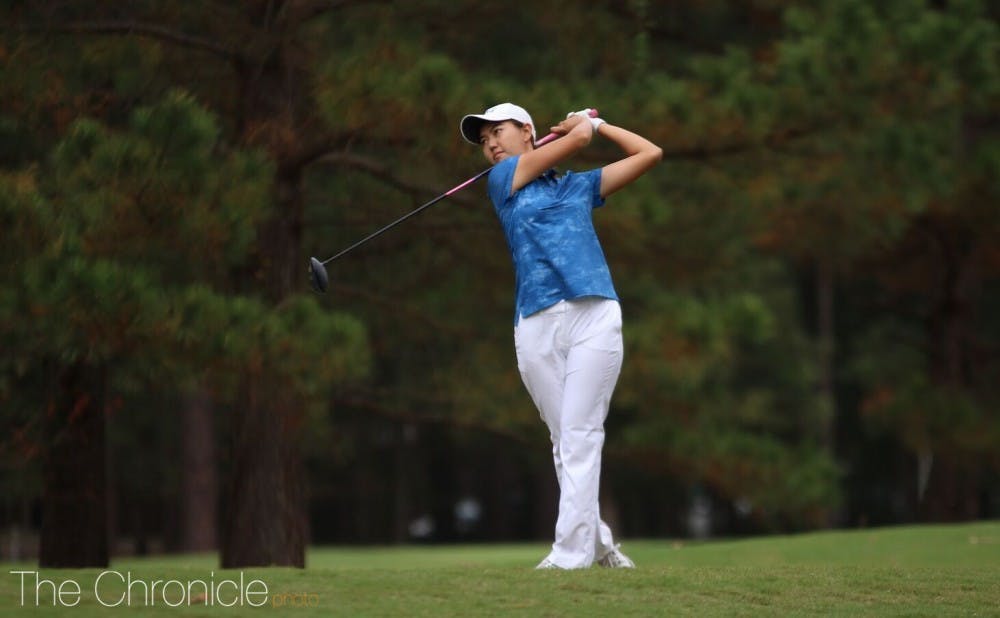With the suspension and later cancellation of all Duke athletic competition due to the spread of coronavirus, many Blue Devil seasons were abruptly cut short. The Chronicle is going to take a look back at those seasons affected as well as what we missed out on with their cancellations. We've already looked at men's basketball, women's basketball, baseball, men's lacrosse, women's lacrosse, and men's tennis. Next up: women's golf.
Season summary
Coming off the program’s seventh national championship, expectations were once again sky high for a group that only lost Virginia Elena Carta to graduation while adding two highly-touted recruits in Megan Furtney and Erica Shepherd. And based on the early returns, it appeared as though the Blue Devils were gearing up for another run at NCAA glory in May.
Duke began its spring season with the Northrop Grumman Regional Challenge in Palos Verdes, Calif. In rainy conditions, the Blue Devils found themselves in third place after day one thanks in large part to a 71 from Furtney and a 74 from junior Miranda Wang. In the second round, a combination of favorable weather conditions and stellar ball striking led to Duke taking the lead by the end of the day. With an eight-shot advantage heading into the final day of competition, the Blue Devils held steady with a one-under team score to secure a seven-stroke victory. Wang and senior Ana Belac both made their way into the individual top-5, with Wang leading the entire tournament with 17 birdies over the three rounds. Furtney overcame a double-bogey and triple-bogey during the initial stages of the inward nine with three straight birdies to finish at even par for the tournament and within the top-15 individually. The results from California were clearly very promising for the Blue Devils.
Next up was the Darius Rucker Intercollegiate in Hilton Head, S.C. All of the courses at the coastal resort are known for being heavily impacted by windy conditions, making it tough to control your ball-flight off the tee and on approach shots. Duke found itself in a tie for seventh in the team competition after a disappointing start over the first two rounds. A six-over showing on day three saw the Blue Devils improve to solo third, with Belac and junior Jaravee Boonchant leading the way with six-over and nine-over individual scores, respectively. The Rucker Intercollegiate marked the final event Duke would compete in, as the tournament concluded just four days before the university suspended all athletic activities.
Team MVPs
Based on the results from the two tournaments, Belac and Wang stood out for the Blue Devils. Both players were capable of providing consistent play at both the ACC and NCAA championships, and both had a vast amount of match play experience.
Belac finished in the top-10 in both events and provided standout performances along the way. With the senior seemingly giving herself makeable birdie looks every time she was attacking from the fairway, it made sense that she was always in control of her game. Belac clearly was the most consistent Blue Devil in the shortened season.
Wang, on the other hand, proved to be a birdie machine, with 28 in total over the 108 holes she played across both tournaments. Having a hot putter can go a long way toward racking up birdies, and Wang had it going on the greens in California and South Carolina. When one also considers the fact that the putting surfaces at Palos Verdes Golf Club are poa annua grass, which is notorious for getting extremely bumpy as the day wears on, Wang’s stretches of stellar play appear to be even more impressive.
What we missed out on
Duke still had two team events left before postseason play would've began, with the Valspar Augusta Invitational and the Big Four Duel in Raleigh on the horizon over the following two weekends after the season was cancelled. Furthermore, four Duke players would have had a chance to sharpen and showcase their skills at arguably the most famous golf course in the world: Augusta National Golf Club. The second annual Augusta National Women’s Amateur was scheduled to take place April 1-4, with the final round being held at the course so widely known for hosting The Masters every year. Belac, Boonchant, sophomore Gina Kim and Shepherd were all in the field, and it would have been a great experience to have the same shots that the likes of Jordan Spieth, Justin Thomas and Rory McIlroy face at Augusta while also facing the pressure of competing in what has become a very prestigious event for women’s amateur golf.
As the calendar shifted to late April, the Blue Devils were likely to have an excellent opportunity to capture the ACC team crown, which would then parlay into the two-week gauntlet that is the NCAA championships (regional and national).
Best-case scenario
Before the season was halted, there were obvious signs that Duke was ready to defend its title from last season. The Blue Devils were ranked No. 4 in the country behind only USC, Texas and Wake Forest. It was very likely that Duke would've ended up taking part in the NCAA championships after regional play wrapped, and at that part, experience and clutch putting oftentimes takes over. As the Blue Devils showed time and time again last year, consistency goes a long way during both the stroke and match play components of the NCAAs, and if Furtney and Shepherd found a way to provide substantial contributions in their first time dealing with the match play pressure, there’s no reason to believe that the Blue Devils could not have figured out a strategy to repeat as national champions. From an individual perspective, Belac may have had an opportunity to challenge for a title of her own if her play up until the season's cancellation was a predictor of future success.
Worst-case scenario
The talent level on this year’s team was simply too high for anyone to anticipate Duke missing out on a chance to be among the final 24 teams in Scottsdale, Ariz., with an opportunity to claim a national title. However, only eight teams are able to advance to the match play portion (which determines the team champion). If the Blue Devils were dealt an unfavorable draw in terms of weather conditions, their chances at a repeat could have been doomed during the stroke play portion. As shown by the first round of the Northrop Grumman Regional Challenge, Duke was prone to struggling if the course got too damp and the ball was not rolling much in the fairways.
Get The Chronicle straight to your inbox
Sign up for our weekly newsletter. Cancel at any time.

Max Rego is a Trinity senior and an associate sports editor for The Chronicle's 118th volume. He was previously sports managing editor for Volume 117.

